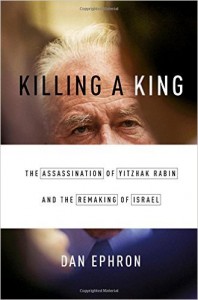 I’ve long shared the same perspective as my friend Hillel Schenker, the Israeli co-editor of The Palestine-Israel Journal, on the tragic and bloody half-year tenure of Shimon Peres as prime minister following Yitzhak Rabin’s murder in Nov. ’95. It’s not commonly shared or discussed in mainstream media, but a few days ago, Hillel sent along a Washington Post article by Dan Ephron, the author of the recently published, Killing a King: The Assassination of Yitzhak Rabin and the Remaking of Israel, that explains in concise detail how Peres messed up a golden opportunity for peacemaking in early ’96. (Hillel even questions the headline’s characterization of Peres as “most fervent peacemaker.”)
I’ve long shared the same perspective as my friend Hillel Schenker, the Israeli co-editor of The Palestine-Israel Journal, on the tragic and bloody half-year tenure of Shimon Peres as prime minister following Yitzhak Rabin’s murder in Nov. ’95. It’s not commonly shared or discussed in mainstream media, but a few days ago, Hillel sent along a Washington Post article by Dan Ephron, the author of the recently published, Killing a King: The Assassination of Yitzhak Rabin and the Remaking of Israel, that explains in concise detail how Peres messed up a golden opportunity for peacemaking in early ’96. (Hillel even questions the headline’s characterization of Peres as “most fervent peacemaker.”)
In short, the long-time rivalry between Peres and Rabin cast its shadow from beyond the latter’s grave. Peres did not announce a snap election shortly after Rabin’s death, which he would have won by a landslide, because he wanted to win on his own record and not Rabin’s. Then he okayed the Shin Bet assassination of Yihya Ayyash, the notorious Hamas bombmaker known as “the engineer.” This precipitated a retaliatory wave of deadly suicide bombings during the election campaign that suddenly made Bibi Netanyahu’s candidacy competitive, and eventually won him his first term in office.
Ephron did not mention two other factors in the disastrous electoral result of May 29, 1996:
- Peres hardly campaigned. When asked “Where’s your campaign” by a writer for The Jerusalem Report during the ’96 election, Peres responded that working hard as prime minister was his campaign.
- And then there was the fiasco of Operation Grapes of Wrath for 16 days in April ’96, with thousands of shells and bombs striking southern Lebanon in response to hundreds of Hezbollah rockets. Peres was sure that there would be hardly any civilian casualties because of the IDF’s extensive advance warnings that the population flee; instead, one or more shells killed about 100 people seeking refuge at a UN base in Qana. This forced Peres to halt the operation and may have actually cost him the margin of victory, because it caused many Israeli Arabs to boycott the polls in protest.
I don’t want to totally condemn Peres as a person and a leader. For one thing, he served a very successful two-year term as prime minister in the late 1980s, when he succeeded Shamir in the rotation agreement following their virtual tie in the 1984 election. But these errors in judgment set in motion events that continue to plague Israel to this day.
To read Ephron’s article, click on this embedded link: “Dan Ephron: How Israel’s most fervent peacemaker squandered his best chance.”





Well intentioned people can get you killed. Like Obama who pressed for the Iran deal, the worst deal in history, I’m sure he had reasonably good intentions. But in effect he paved the road for Iran to build nuclear missiles. I’m pretty sure Peres had good intentions but he initiated the disastrous Oslo Accords which cost many Israeli lives and help promote the false narrative that Israel is illegally occupying Judea and Samaria (aka West Bank).
He is adored by the same people who adored the most 2 faced terrorist leader in the world, Yasser Arafat. I am against the world making him into a saint. He was far from it. Furthermore making him into a hero detracts from the real heroes in the world. I for one, will not miss him!